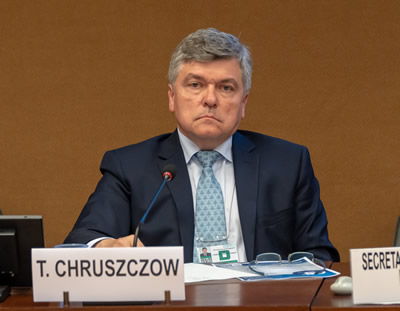Representatives from countries with experience of diverse types of “shock” – whether it was Ebola, rising sea levels or sovereign debt – shared their experiences at a high-level panel of the Trade and Development Board on 5 June, with most agreeing that collective action was the best way to prepare for both unexpected and predictable disasters.
UNCTAD Deputy Secretary-General Isabelle Durant, moderating the discussion, asked panellists what they viewed as the building blocks of social, economic and environmental resilience.
First to respond was Tomasz Chruszczow, Poland’s top climate change envoy who steers his country’s preparations to host the next edition of the international community’s annual climate conference, or COP24, in December.
He said that climate change was the primary threat to the world.
But multiple shocks would follow in its wake, he underlined, citing as health emergencies like a rise in insect-borne diseases and food scares caused by wrecked harvests.
The 2030 Agenda for Sustainable Development encompassed preparedness for this multiplicity of shocks while the Paris Agreement on climate change recognized the mechanisms of implementation for building resilience, Mr. Chruszczow said, including climate finance.
An example of this was the way small island developing countries had negotiated a “loss and damage” facility in the Paris Agreement.
Better together
Mere Falemaka, who represents the Pacific Islands Forum in the United Nations in Geneva, said that the economic and environmental vulnerabilities of Kiribati, the Solomon Islands, Tuvalu, and Vanuatu – the four Pacific Islands that are categorized for special treatment as least developed countries (LDCs) – would be exacerbated by loss of concessional financing when they graduate from the LDC category.
One initiative by the Pacific’s small island states has been to unify their foreign policy around a “Blue Pacific” identity that underlines their stewardship of the ocean for the world. This included greater regional economic integration and emphasis on e-commerce to overcome isolation and build resilience.
Ms. Falemaka said that E-Trade Readiness Assessments had been and are being undertaken by UNCTAD and regional leaders were active in securing finance for climate change mitigation.
Jamaica’s ambassador the United Nations in New York, Courtenay Rattray, said the experience of Pacific Islands resonated with Caribbean states, apart from perhaps the existential threat of rising oceans, but debt exposure and market isolation were familiar themes.
Double whammy
The sectors that make up most of Jamaica’s economy – tourism, agriculture and mining – were vulnerable to market volatility and the country was therefore diversifying into e-commerce and transport logistics, Mr. Rattray said.
Sierra Leone’s ambassador to the United Nations in Geneva, Yvette Stevens, said that her country, despite recovering from a civil war that ended in 2002, was hit by the double whammy of Ebola and a fall in commodity prices in 2014 which devastated the economy.
As well as the immediate crisis of controlling the virus, she said her government had shored up Sierra Leone’s economy by quickly resuming iron ore mining after two international companies had packed up and left the country.
“At the end of the day we were able to emerge from the Ebola crisis after two years,” she said. “We are now again on the road to recovery.”
Ajay Kumar Bramdeo, who represents the African Union in Geneva, said that the signing of the African Continental Free Trade Agreement (AfCFTA) in March 2018 had taken the continent forward in terms of regional integration and creating a single market. He said that AfCFTA was a rebuke to the history of colonialism that had left Africa with small, unsophisticated and resource-dependent economies.
Instrument of resilience
Mr. Bramdeo said that “business as usual in global terms” in which Africa was simply a supplier of raw materials to the world, which re-exported back to the continent finished goods at astronomical prices, would no longer do.
“AfCFTA is a means of integration and therefore an instrument of resilience,” Mr. Bramdeo said.
He added that Africa was “the biggest victim of climate change without having contributed to it” but AfCFTA was a step toward what was needed it to mitigate it.
The expert panellists were also invited to ask each other questions, to fuel debate.
Mr. Rattray asked Ms. Stevens about forms of sovereign insurance and whether more countries could benefit from them, as Sierra Leone had after its Ebola crisis. She agreed that they could.
Ms. Stevens asked Mr. Bramdeo how AfCFTA could help build resilience in a country like Sierra Leone. He said that commodity dependence was the source of Africa’s increased vulnerability to both economic and environmental threats – and that Africa’s historic call for skills and technology transfer had gone unheard
Hope remains
However, countries like Sierra Leone had the potential to “leapfrog” technological phases if skills were upgraded and they were able to move into new economic activities like renewable energy, Mr. Bramdeo said.
Mr. Chruszczow said it was very important to involve small-scale entrepreneurs and civil society groups in building state-level resilience, and Ms. Stevens said that governments also had a role to play.
Interventions from various UNCTAD member countries indicated that hope remained for further deepening of collective action, although others said that the primary responsibility lay with national governments.



